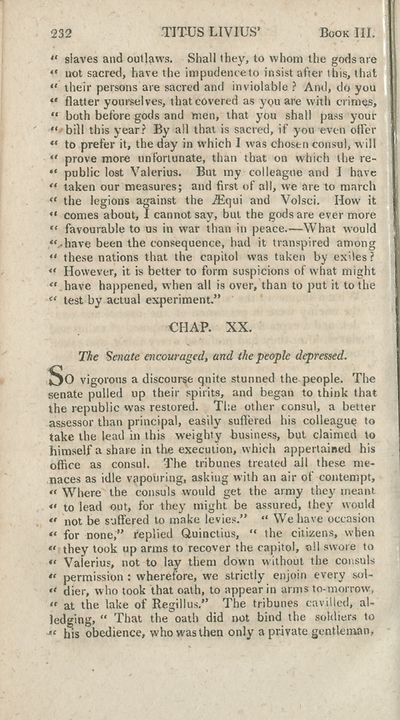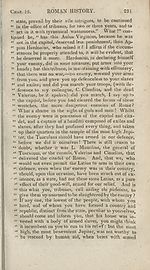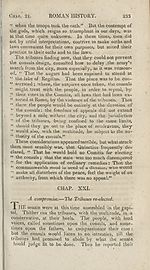Download files
Complete book:
Individual page:
Thumbnail gallery: Grid view | List view

232
TITUS LIVIUS’
Book III.
*' slaves and outlaws. Shall they, to whom the gods are
“ not sacred, have the impudence to insist after this, that
“ their persons are sacred and inviolable ? And, do you
“ flatter yourselves, that covered as you are with crimes,
“ both before gods and men, that you shall pass your
“ bill this year? By all that is sacred, if you even offer
to prefer it, the day in which I was chosen consul, w ill
“ prove more unfortunate, than that on which the re-
“ public lost Valerius. But my colleague and I have
taken our measures; and first of all, we are to march
“ the legions against the Aiqui and Volsci. How it
“ comes about, I cannot say, but the gods are ever more
“ favourable to us in war than in peace.—What would
“^have been the consequence, had it transpired among
“ these nations that the capitol was taken by exdes ?
«* However, it is better to form suspicions of what might
“ have happened, when all is over, than to put it to the
“ test by actual experiment.”
€HAP. XX.
'The Senate encouraged, and the people depressed.
So vigorous a discourse qnite stunned the people. The
senate pulled up their spirits, and began to think that
the republic was restored. The other consul, a better
assessor than principal, easily suffered his colleague to
take the lead in this weighty business, but claimed to
himself a share in the execution, which appertained his
office as consul. The tribunes treated all these me¬
naces as idle vapouring, asking with an air of contempt,
“ Where the consuls would get the army they meant
*• to lead out, for they might be assured, they would
«» not be suffered to make levies.” “ We have occasion
“ for none,” replied Quinctius, “ the citizens, when
“ they took up arms to recover the capitol, oil swore to
«* Valerius, not to lay them down without the consuls
•• permission : wherefore, we strictly enjoin every sol-
•< dier, who took that oath, to appear in arms to-morrow,
« at the lake of Regillus.” The tribunes cavilled, al¬
ledging, “ That the oath did not bind the soldiers to
his obedience, whowasthen only a private gentleman.
TITUS LIVIUS’
Book III.
*' slaves and outlaws. Shall they, to whom the gods are
“ not sacred, have the impudence to insist after this, that
“ their persons are sacred and inviolable ? And, do you
“ flatter yourselves, that covered as you are with crimes,
“ both before gods and men, that you shall pass your
“ bill this year? By all that is sacred, if you even offer
to prefer it, the day in which I was chosen consul, w ill
“ prove more unfortunate, than that on which the re-
“ public lost Valerius. But my colleague and I have
taken our measures; and first of all, we are to march
“ the legions against the Aiqui and Volsci. How it
“ comes about, I cannot say, but the gods are ever more
“ favourable to us in war than in peace.—What would
“^have been the consequence, had it transpired among
“ these nations that the capitol was taken by exdes ?
«* However, it is better to form suspicions of what might
“ have happened, when all is over, than to put it to the
“ test by actual experiment.”
€HAP. XX.
'The Senate encouraged, and the people depressed.
So vigorous a discourse qnite stunned the people. The
senate pulled up their spirits, and began to think that
the republic was restored. The other consul, a better
assessor than principal, easily suffered his colleague to
take the lead in this weighty business, but claimed to
himself a share in the execution, which appertained his
office as consul. The tribunes treated all these me¬
naces as idle vapouring, asking with an air of contempt,
“ Where the consuls would get the army they meant
*• to lead out, for they might be assured, they would
«» not be suffered to make levies.” “ We have occasion
“ for none,” replied Quinctius, “ the citizens, when
“ they took up arms to recover the capitol, oil swore to
«* Valerius, not to lay them down without the consuls
•• permission : wherefore, we strictly enjoin every sol-
•< dier, who took that oath, to appear in arms to-morrow,
« at the lake of Regillus.” The tribunes cavilled, al¬
ledging, “ That the oath did not bind the soldiers to
his obedience, whowasthen only a private gentleman.
Set display mode to:
![]() Universal Viewer |
Universal Viewer | ![]() Mirador |
Large image | Transcription
Mirador |
Large image | Transcription
| Antiquarian books of Scotland > Curiosities & wonders > Titus Livius' Roman history > (236) |
|---|
| Permanent URL | https://digital.nls.uk/115985981 |
|---|
| Description | Thousands of printed books from the Antiquarian Books of Scotland collection which dates from 1641 to the 1980s. The collection consists of 14,800 books which were published in Scotland or have a Scottish connection, e.g. through the author, printer or owner. Subjects covered include sport, education, diseases, adventure, occupations, Jacobites, politics and religion. Among the 29 languages represented are English, Gaelic, Italian, French, Russian and Swedish. |
|---|

